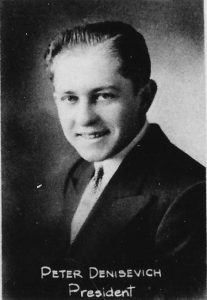“North Street’s Lt. Colonel”
By James VanBever
Peter Denisevich was born on North Street in Graniteville on June 15, 1915. He was the son of Joseph and Barbara (Belida) Denisevich. Peter’s father came to the United States from Russia in 1905 and later returned to that country to bring back his wife Barbara. Their house was located across from North Street Automotive. Peter graduated from the Sargent School in 1929 and from Westford Academy in 1933 where he was Senior Class President.
the United States from Russia in 1905 and later returned to that country to bring back his wife Barbara. Their house was located across from North Street Automotive. Peter graduated from the Sargent School in 1929 and from Westford Academy in 1933 where he was Senior Class President.
After graduating from Westford Academy, Peter enrolled at Boston University as part of the R.O.T.C. program, where he became a commissioned reserve army officer. Shortly after graduating from B.U. with a degree in Education, he went on active duty with the U.S. Army. In 1940, Peter was one of one hundred officers out of one thousand whom the Army elevated to the rank of 2nd Lieutenant after a competitive examination. Three years later, the military promoted Denisevich to the rank of major.
An infantry officer, Denisevich served in Europe during World War II with Terry Allen’s famed 104th Timberwolves Division. Promoted to Lt. Colonel Peter was “cited for meritorious service in connection with military operations in Belgium, Holland, and Germany from October 23, 1944 to January 29, 1945. “The citation went on to say that Lt. Colonel Denisevich led his battalion skillfully and courageously during the entire period of combat with the enemy.” In addition, the military credited him for his personal bravery when he exposed himself to enemy fire to ensure the safety of his men. For these heroics, the U.S. Army awarded him the Bronze Star.
Despite Denisevich’s bravery and leadership during the European campaign, the Westford native gave most of the credit to the troops who served under his command. After the war, Lt. Colonel Denisevich reflected on the accomplishments of his troops, “You take a bunch of guys from Harlan County, Kentucky and Walla Walla, Washington, and Back Bay, Boston and put them in the American Army and you have the best fighting outfit in the world. Peter spoke with amazement at what his soldiers did. He thought they were the greatest guys in the world.
In 1945, shortly after the war in Europe ended, the U.S. Army sent Peter Denisevich, who was fluent in Russian to the United States embassy in Moscow to serve as Assistant Military Attache to Russian Ambassador General Bedell Smith. It was in Russia that he met his first wife Rose Wiley who was an American. Lt. Colonel Denisevich’s new position included “obtaining and analyzing information on Soviet military and industrial capabilities as well as the changing social structures in the Soviet Union and reporting the information back to Washington, D.C.
Lt. Colonel Denisevich returned to the United States in 1947, where the Army assigned him to the Central Intelligence Agency in Washington. Denisevich served as “chief economic analyst in the U.S.S.R. branch coordinating research analysis on Soviet economic capabilities, providing advisories to the Joint Chiefs of Staff, the National Security Council and President Harry Truman.”
In the years following World War II, Peter returned to Europe on numerous C.I.A. assignments including the establishment and expanding of a defector inducement program that analyzed Russian capabilities. In 1953, he returned to the United States and became a Russian instructor at the United States Military Academy at West Point. Later, he would become Dean of Students at the Army Intelligence School in Maryland.
In 1959, after 21 years in the United States Army, the North Street native retired from the military. He then accepted a position at the Stanford Research Institute in California assisting groups analyzing Russian military technical abilities. After his time at Stanford, Peter worked with Kaiser Engineers and Global Associates in various roles employing his vast analytical, organizational, and teaching background in training and security projects.
But despite Peter Denisevich’s wide travels, he always managed to visit and maintain contact with his family and friends in Westford. He was a lifetime member of the Westford Academy Alumni Association and would often travel great distances to Westford to attend Alumni banquets and events. Peter would also write letters to the Lowell Sun to tell of his travels and experiences.
Lt. Colonel Peter Denisevich died on March 2, 2009 at his home in Nashua, New Hampshire. He is interred at the Russian Brotherhood Cemetery in Westford.
Sources:
“Graniteville youth to get commission,” Lowell Sun, July 1, 1940, p. 119.
Ibid. “Promoted to Major,” January 12, 1943, p. 23.
Ibid. “Wins Bronze Star,” March 24, 1945, p. 3.
Ibid. “Sampascoopies,” by Chares G. Sampas, September 22, 1945, p. 6
Ibid. “And have you heard,” by Barbara A. Browne, April 8, 1947, p. 7.
Ibid. “And have you heard,” by Rosalie Marzbanian, August 22, 1950, p. 25.
Ibid. “W.A. Alumni Assn. Hold Annual Reunion,” June 20, 1954, p. 13.
“Peter Denisevich,” Nashua Telegraph, April 17, 2009, p. 19.
“Birthday Impressions on Parade, 200th Anniversary of Westford Academy” Westford Eagle, October 24, 1991, p. 10.
“Graniteville Colonel off to Moscow,” by James F. Droney, newspaper and date unknown.
